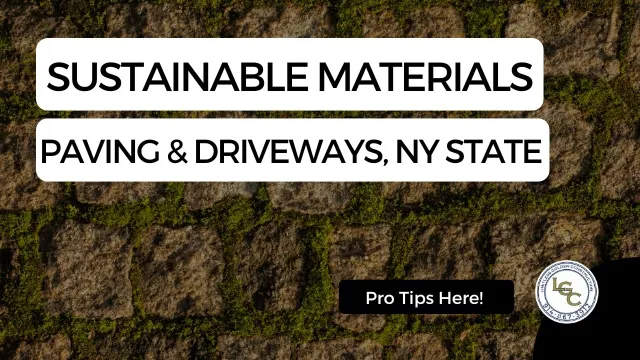In today’s world, sustainability isn’t just a buzzword, it’s a necessity. For residents of New York State, considering eco-friendly options for paving and driveways can lead to significant long-term benefits. Whether you’re working on a commercial project or updating your private property, here’s everything you need to know about sustainable materials and the environmental laws that govern them.

Eco-Conscious Choices for Your Home’s Exterior
When it comes to creating a sustainable home, the exterior is just as important as the interior. And choosing sustainable materials for your paving and driveway can have a positive impact on the environment, while also enhancing the curb appeal of your property.
Sustainable Materials: Going Beyond Traditional Paving Options
When it comes to paving, traditional materials like asphalt and concrete are no longer the only choices. Sustainable options include:
- Permeable Pavers: These allow water to pass through, reducing runoff and promoting groundwater recharge.
- Recycled Materials: Using crushed concrete or reclaimed asphalt can significantly reduce the environmental impact.
- Bio-based Products: Innovative options like soybean oil-based sealants offer an eco-friendly alternative to petroleum-based products.
Understanding the Benefits of Sustainable Materials
Choosing sustainable materials for your paving and driveway offers a myriad of benefits, both for the environment and for your own property. Here are some key advantages to consider:
- Reduced Carbon Footprint: Sustainable materials require less energy and resources to produce, reducing their carbon footprint.
- Stormwater Management: Permeable pavers and other eco-friendly options help manage stormwater runoff, preventing flooding and pollution.
- Longer Lifespan: Many sustainable materials have a longer lifespan than traditional options, reducing the need for frequent replacements and repairs.
Environmental Laws Governing Paving in NY
As residents of New York State, it’s important to be aware of the environmental laws and regulations that govern paving and driveway materials. These laws aim to protect natural resources, preserve air quality, and promote sustainable practices.
New York State Department of Environmental Conservation (NYSDEC)
The NYSDEC is responsible for enforcing environmental laws in New York State. They have specific guidelines for the use of sustainable materials in construction projects, including paving and driveways. It’s important to consult their regulations before beginning any project.
Environmental Protection Agency (EPA) Regulations
The EPA also has regulations in place regarding the use of sustainable materials. They oversee water pollution control program

